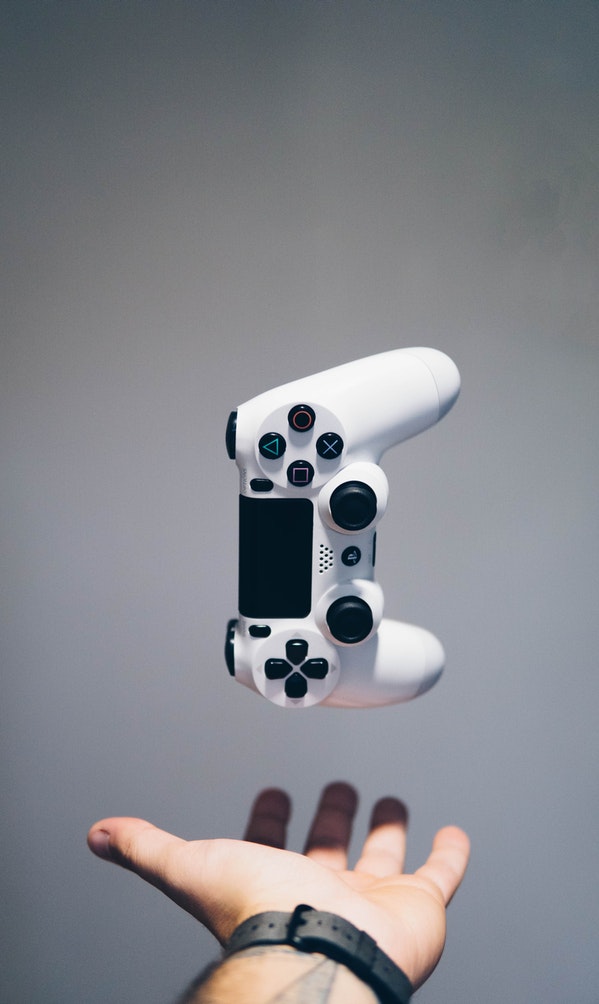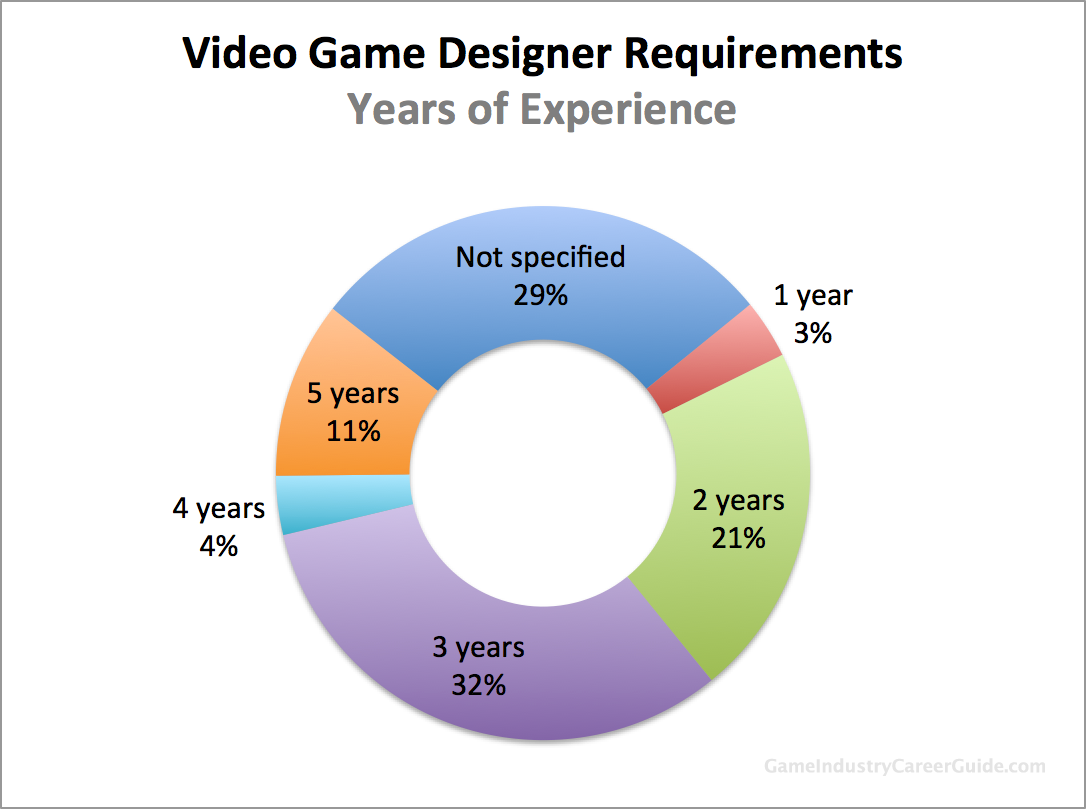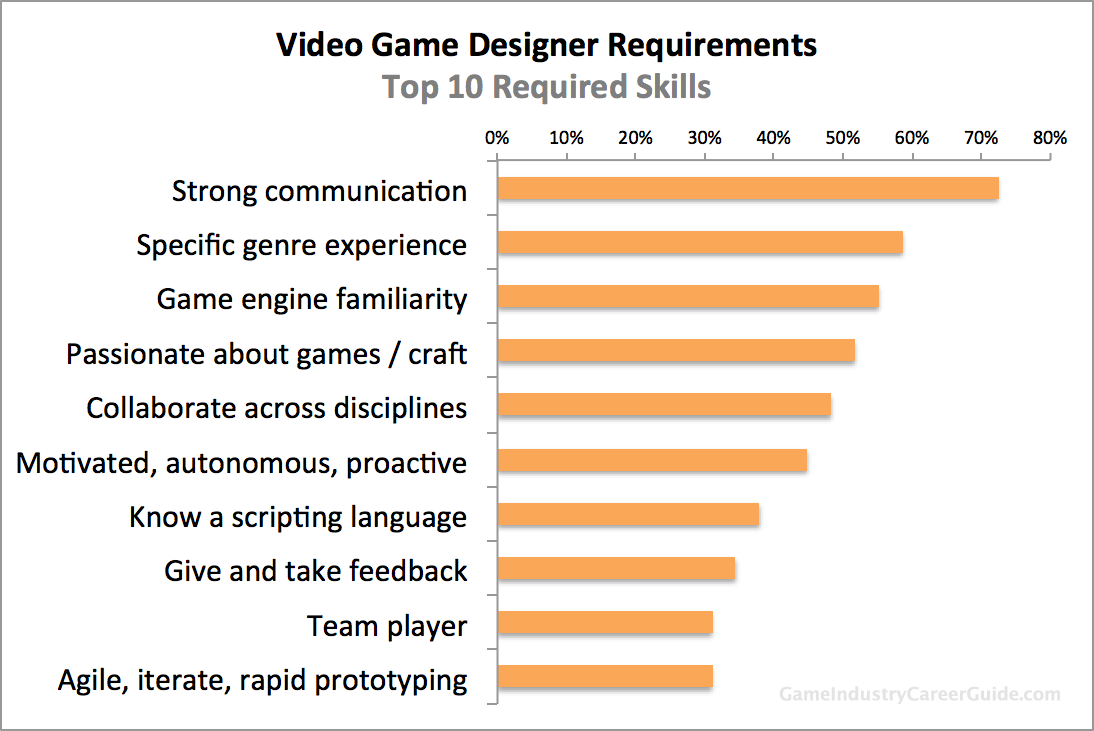Video Game Designer Requirements

Is your goal to become a video game designer, but you don’t know how to get there? Start by understanding the game designer requirements and qualifications that game companies demand.
Every game company has specific requirements you’ll need to meet before they’ll hire you as a game designer. Luckily, you don’t need to ask companies what those are. Instead, simply find an online job posting by any game studio you’d like to work for, and read the game designer job requirements they’ve listed. It’s that easy.
Want a job at Infinity Ward? According to their game designer job postings, you’ll need to be creative, with the ability to communicate your ideas to your team. Want a job at Rockstar Games? According to their job postings, you’ll need the ability to multi-task and prioritize work based on feedback and critique. Learning how to do those things might be challenging, but learning the requirements is easy — just read the job postings.
To give you a head start, I did the research for you. I studied 29 game designer job postings from multiple companies, and summarized them in the study below. I’ve paired each one with advice on how to start working on the skills you’ll need to land the job. If you want a job as a video game designer, you’ve come to the right place.
Game Designer Requirements: Education
It’s common for game companies to require a bachelor’s degree, but I can tell you from experience that it’s almost always a negotiable qualification for game designers. Most hiring managers will waive the requirement if you already have enough on-the-job experience. Some job postings will even specify “Bachelor’s degree or equivalent experience,” so you know it’s not a hard requirement.
In my study, I found that 41% of companies listed an educational requirement of an undergraduate/bachelor’s degree, but they also implied equivalent experience was okay. (One simply mentioned “a degree means something.”) The other 59% didn’t list an education requirement at all.
Note: If you want to know which bachelor’s degrees might be good for a job in game design, read my article about game designer education requirements.
Game Designer Requirements: Experience
It might seem unfair for companies to require a certain number of years’ experience, or a certain number of shipped games. After all, how can you land your first job if they require you to already have experience?
Luckily, about a third (29%) of companies had no “years of experience” qualification. While the others do require anywhere from one to five years experience, this is another requirement that’s usually a bit flexible. If you’re fresh out of school, my advice is this: Go ahead and apply for jobs that require one or two years of experience. Because they just might accept you.

What about a “shipped games” requirement? Good news: 38% of companies had no shipped games requirement. The remainder of companies required at least one shipped game on your resume before they’ll consider hiring you. But again, this is often flexible. If you have a strong design portfolio with projects you completed in school or in your spare time, you should apply anyway.
Top 10 Game Designer Requirements
The day-to-day job of a game designer is different from company to company. But some core skills are required by nearly all designers, which is why they show up on many of the job postings.
Let’s take a look at the top ten most common “must have” game designer requirements, and discuss what you can do to build those qualifications so you can apply for the jobs.

1. Communication Skills
Required by: 72%
By far, the most-required skill for a game designer is an ability to communicate ideas clearly and effectively. As Age of Learning‘s job posting puts it, it’s the “Ability to communicate equally well with technical and non-technical team members, both verbally and in writing.”
Strong verbal communication skills are important because, as a game designer, you’ll be coordinating your work with artists, programmers, other designers, and executives. Almost every day. And if you aren’t good at explaining your thoughts and ideas, or collaborating with others, you won’t be able to do your job effectively.
As a game designer, you’ll also do a lot of writing. You may write the game’s quests and storylines. You may write the game’s initial “pitch” document. You’ll definitely write (or at least contribute to) your project’s game design document. And at many studios, you’ll need to write functional specifications and other documents to describe the game’s features to your team. Not to mention all the emails you’ll write every day.
If you need to improve your written and verbal communication skills, there are a number of ways to practice. If you’re in school, try taking classes like creative writing, technical writing, debate, and speech. If you’re not in school, consider joining local groups in your area such as Toastmasters, or signing up to speak at local game industry meetups.
2. Game Genre Knowledge
Required by: 59%
Game developers use the concept of genre as a way to classify and group games that are similar. Examples of game genres are first-person shooters, puzzle games, and side scrollers. But there are dozens more.
Because there are so many different genres, it’s difficult to become skilled at designing more than one or two. That’s why most game designers — and most game companies — pick a genre and stick with it until they’re experts. Sometimes it takes years.
In this study, 59% of companies require their designers to be specialists in a specific genre. But there’s a catch: different companies require different genres. It all depends on what kind of game the company needs you to design. For example, Nerd Studio requires their designers to have “Experience in designing for an open world sandbox style of game,” while PopCap requires an “Affinity for the puzzle and platforming game audiences.”
There isn’t time to specialize in all genres, so you’ll need to focus on learning just one or two. Start by thinking about what kinds of games you’ve enjoyed most in your life. For example if you spend most of your time playing Halo or Call of Duty, consider specializing in first-person shooters. Because if you already love playing one kind of game, you’ve already got a head start on specializing in that genre.
3. Game Engine Knowledge
Required by: 55%
Game companies prefer to hire designers who can start getting work done right away, without a learning curve. That’s why over half of companies in the study listed specific game engine experience in their list of video game designer requirements.
The most common game engine mentioned was Unity 3D, followed by Unreal Engine. Some studios are a bit more flexible in their requirements, noting only that they want designers to have experience using one or more 3D game engines. For example, Battlecry Studios wants designers that have “Experience with a variety of established game toolsets.”
If you want to design games for a living, you definitely need to learn how to use a game engine. But game engines are large, complex software packages, so the sooner you start learning, the better. Fortunately, most game engines are free for you to download and use as a student or hobbyist. For more ideas on getting started, read this article about free game engines.
4. Passion for Your Craft
Required by: 52%
How passionate are you about playing and designing video games? If you said “a little bit,” then half of companies in this study don’t want you on their team. Game studios don’t want designers who are just game geeks. They want game design geeks.
Do you study each game’s features and rules, and try to understand what makes it a compelling and fun experience? Do you geek out about the psychology behind video games? Do you read articles and discussion groups to help you understand, as one job posting put it, “Knowledge of game industry, trends, competition, platforms and market?”
Game studios don’t want designers who are just game geeks. They want game design geeks.
If not, then I suggest you get started. Because that’s what’s required to get a job at more than half of the companies in this study, including PlayStation Network, Respawn Entertainment, EA, Amazon Games, and others.
5. Collaborate Across Discipines
Required by: 48%
Game design can be described as the “glue” that brings together the work of every job on the game team. That means game designers need to understand each of the other disciplines — artists, programmers, audio engineers, and more — at least enough to have meaningful conversations about their work.
For example, let’s say you’re designing a game’s combat system. You’ll need to talk with programmers about the combat code, talk with animators to work out the timing of movements and attacks, talk with audio engineers about the timing and implementation of sound effects, and talk with quality assurance testers about finding and fixing bugs.
As Jumpstart Games put it in their job posting, game designers must be “Comfortable directing input with other disciplines such as Art, Animation, Programming, Audio and Narrative Design.”
The best way to understand all those other disciplines you’ll collaborate with, is to dive in and do some of their work yourself. If you’re in school, take some classes in art, programming, and creative writing. Or if you have time on the weekends, try your hand at modifying (“modding”) a popular game. Modding is an easier way to become a “one-person game team” and get a feel for art and code. As a bonus, you can use your finished mod as a portfolio piece in your game design portfolio!
6. Self-motivated and Proactive
Required by: 45%
Like many creative jobs, game designers often work without a clear set of instructions. Often, it will be up to you to figure out how to succeed in your job, without much oversight from managers. In fact, many smaller game studios don’t even have management to watch over individual game designers. Some, like Valve Software, don’t have traditional managers at all.
Which means game designers are required to take initiative and figure things out, even without direct oversight. It means taking ownership of your work and your project, and never saying “that’s not my job.” As KIXEYE puts it in their job postings, designers are required to be “Self-starters with a good sense of accountability and ownership.”
Ownership and self-motivation can be hard skills to learn. But you can do it with practice. Rather than just focusing on whatever work you’ve been assigned, start a habit of looking at the big picture. What is your team (or your class, or your family) as a whole is trying to accomplish? What additional work could you take on that would help achieve your group’s goals — even if nobody has assigned it to you? That’s being proactive and self-motivated. And it’s a common video game designer requirement.
7. Scripting Language Knowledge
Required by: 38%
A “scripting language” is a simplified version of a programming language. Common examples include Lua, Python, and JavaScript. There are also visual scripting languages, such as Blueprints (in Unreal Engine), and Bolt (in Unity 3D).
As a game designer, it’s a good idea to learn one or more scripting languages. Why? Because most commercial game engines require designers to do scripting to control the behavior of enemies, puzzles, quests, and other game features. For example, you might use scripting to tell the game engine to open a door whenever the player is nearby, has a key, and presses the correct button.
Over one third of game studios in the study require that you know a scripting language before you apply for a job. That’s likely because they’re using game engines that require scripting — but they don’t want to spend the time to train you after they hire you. They want you to already know scripting, so you can be productive right away.
The Playstation Network job posting says “basic knowledge of scripting languages and code (eg, XML, C++, PERL) is valued,” but it’s not required. On the other hand, Treyarch requires designers to be “skillful with C, C++, or non-visual scripting languages” — and you must be “willing and able to pass a studio scripting test.”
So if you haven’t started learning a scripting language, start now. There are free YouTube videos, or paid courses on sites like Lynda.com. I found a free online tutorial teaching C# to new programmers, and you can practice in your web browser.
8. Give and Take Feedback
Required by: 34%
Game design and development is a highly creative, highly artistic job. It takes huge amounts of creativity — and creative risk-taking — to make something new that players love. But not all of your ideas will be good, and not all of your designs will be fun. Even the best game designers make mistakes. Most have shipped entire games that were commercial failures. (I certainly have!)
That’s why part of working on a game team is taking critique from your teammates. Infinity Ward‘s game designer requirements include having the “Ability to take feedback from Lead Designers to iterate and improve your designs.” Ubisoft requires a “Willingness to respond to and adapt to constructive criticism.”
It’s hard to hear your idea is bad, especially if you’ve put a lot of work into it. But if you take criticism gracefully, and use it to improve your work, you’ve got a shot at making a successful game. On the other hand, if you get angry or defensive whenever someone critiques your work, you’re unlikely to succeed as a game designer.
It’s hard to hear your idea is bad, especially if you’ve put a lot of work into it. But if you take criticism gracefully, and use it to improve your work, you’ve got a shot at making a successful game.
Is taking constructive criticism a skill you haven’t quite mastered? You’re not alone. It’s a tough one, and it takes practice. Try to remind yourself that any and all feedback can be used to improve your game. Instead of dreading feedback from your teammates, start looking forward to it eagerly. View all criticism for what it really is: a valuable tool to help you make the very best games possible.
9. Be A Team Player
Required by: 31%
The term “team player” has become such a cliché that it actually appears on Wikipedia’s list of sports clichés. In the Sports clichés used in business section, no less. Even so, you’ll see it listed as a requirement on many game designer job postings.
And for good reason: Game development is a team sport. If you can’t get along with other people on your team — especially during challenging times or difficult conversations — then you won’t be successful as a game designer.
Teamwork skills are hard to learn on your own. The best way to improve (maybe the only way) is to practice. Actually participate in projects as part of a team. Most schools offer team-based projects and homework, but if yours doesn’t, then you’ll need to make those opportunities yourself. Start a group project with your friends on the weekends, or join a local club that does group projects and events. Then work to become the most collaborative, reliable, positive, and fun teammate you can be.
Becoming a great teammate can be challenging, but the ball’s in your court. And remember, there’s no “i” in “team.”
10. Be Agile, Iterate, and Prototype Rapidly
Required by: 31%
There’s a key difference between video games and traditional “business” software: Games have to be fun.
When you’re making business software, like a website or a spreadsheet program, it’s common to start with a list of tasks customers want to be accomplish by using your software. If you can create the features needed to accomplish the tasks, then you can ship the software knowing you’ve made something useful.
But with video games, the software also needs to be fun, interesting, and keep players engaged for possibly hundreds or thousands of hours. And that requires a lot of trial and error. So game designers start by making several small prototypes of the game, which they test with players to see if they’re fun. Then they iterate — they keep the features players thought were fun, and improve (or throw away) the ones that weren’t.
The faster you can iterate on your game designs, the faster you can “find the fun.” And the faster you can finish the game. That’s why rapid prototyping and iteration are important game designer requirements for success. As Flatter Than Earth put it in their job posting, designers must be able to “Evolve designs and prototypes based on play testing and feedback.”
To excel at rapid prototyping, start by learning your design tools extremely well. The better you are at using your design tools (such as Unity, Unreal, or Maya), the faster you’ll be able to prototype. Some designers prototype using simpler tools like GameMaker Studio, and some even test their designs on paper when possible. Then get in the habit of trying your designs with real people. Watch them play, listen to their feedback, and improve your designs until your game is the best it can be.

Summary
There you have it, the top 10 video game designer requirements from this survey. While 29 job postings is a fraction of the job openings posted each year, I think you’ll find it’s well-representative of the game industry as a whole. So as you work to educate yourself in video game design, be sure to practice the foundational knowledge as well as the interpersonal skills mentioned in this survey.
With effort and directed practice, you’ll be landing a job as a game designer before you know it.
Research Methods
To compile this study, I searched online for game designer job postings from a variety of game companies of various sizes. Then I made a giant spreadsheet of all the requirements they listed, grouped them by theme, and summarized them into this report.
- Number of job postings analyzed: 29
- Number of studios represented: 28
- Job titles included: To compile requirements only for more entry-level design jobs, this survey includes job postings specifically for the title “Game Designer” and “Associate Game Designer.” More advanced jobs such as “Senior Game Designer,” and non-professional jobs like “Game Design Intern,” were omitted.
- Jobs posted November-December 2017 from these companies:Activision, Age of Learning, Amazon Games, BattleCry Studios, Bodhi Talent Solutions, Booz Allen, Bungie, Collabera, Cubic, Digital Intelligence Systems, Disney, EA, Flatter Than Earth, Infinity Ward, Jam City, Jumpstart Games, KIXEYE, Nerd Kingdom, Niantic Labs, PopCap, Randstad, Respawn Entertainment, Rockstar Games, SAIC (Army Game Studio), Sony Interactive Entertainment, Treyarch, Tynker, Ubisoft.
Read my new book!
Making games for a living is an incredibly rewarding career, but it’s hard to break in unless you have insider knowledge. This book levels the playing field.


Very insightful post. It certainly does help in pointing in the right direction. To be frank though, it is certainly very tough for those that have no prior experience or any domain knowledge in the gaming industry to get an actual break (speaking from one who did a 360 career change with not much technical IT background). Fortunately, someone suggested for me to try this QA for games a shot and it gave me some form of direction and start.. and I am building my experiences from it that I can use as well as include it in my portfolio for future career opportunities.
Hi Brandon, I agree, QA can be a “foot in the door” to the game industry — my first job at a game studio was as a QA tester. There are many ways to break in, though, especially for people doing a career change. I made a list at 10 proven ways to break into the game industry.
Great Blog, very helpful, so much information. I have been helping beginners getting into the video game industry, lots of people ask me how do they get their foot in the door, and I always referred them to this.
You’re welcome, Jack, and thank you for the referrals!
Thanks a lot for sharing this great blog. The information is very helpful. Your site is a gateway for the new comers to the industry nice work keep it up. I must share this site with other people.
Thanks for stopping by, Tracy, I’m glad it’s been helpful.
thanks author
You’re welcome, Mahe, thanks for reading!
Quick question: Are you a Video Game Designer (Or something close to it) yourself? If you are, would you be willing to let me interview you for my school project? It counts as our exam, and I’ve tried everyone I can think of, but nobody’s answered (I contacted them BEFORE Christmas, and still no answer to this day). I need to find someone, but the due date for the assignment is day after tomorrow…
Hi Alex, sorry I couldn’t help with your assignment, I hope you found somebody in time! :O
Hey there! This website is an absolute gem for an aspiring Game Designer such as myself, strange how I never came across it before! Quick question: I am citing some of the content on this website for an assignment of mine, and that also requires me to insert the publishing date of the articles I find. Until now, I’ve been using earliest comments as the posting time. Is there somewhere I might be able to access the real publishing dates? Thanks for the help!
Hi Tal, thanks for the kind words! The articles don’t show the dates, because I update them a lot and it would be misleading to just show the date published. This one was published on Jan 2, 2018, and last updated Aug 1, 2020.
I need some tips, I have always wanted to become a game designer since I was a little kid but I never knew how someone would go about doing that that. These articles had helped to an extent but I need some help. I’m 14 and in the tenth grade, I was hoping you would be able to point me in the right direction. Do you have any ideas where I should start?
Hi Jeremiah, as you can see from the above, game designers come from a variety of educational backgrounds. Take a look at this article, I think it will help: What education is required to become a game designer?